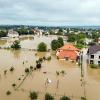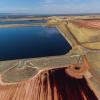News
Displaying Results 51 - 75 of 341
The Convention on the Protection and Use of Transboundary Watercourses and International Lakes (Water Convention), adopted in Helsinki on 17 March 1992, entered into force 20 years ago, on 6 October 1996. Over the past two decades, the Water Convention, which is serviced by UNECE, has become a…
Water scarcity and droughts are occurring more and more frequently and with increased magnitude, even in previously water-rich countries. Major causes include population growth and increasing water extraction, with climate change further exacerbating the situation. OECD and the Global Water…
With a view to possible accession of Uganda to the Convention on the Protection and Use of Transboundary Watercourses and International Lakes (Water Convention), a national meeting was organized on 15 November in collaboration with the Ugandan Ministry of Water and Environment to increase…
With 90% of water resources in Africa located in 63 transboundary basins, water management requires strong transboundary cooperation. This cooperation can bring multiple benefits in terms of human health, sustainable agriculture, climate change adaptation, ecosystem protection, peace and…
Almost all of Botswana’s territory sits within transboundary rivers basins. Although landlocked, Botswana is therefore a ‘water-linked’ country. The Cubango-Okavango, Limpopo, Orange-Senqu and Zambezi Rivers all provide crucial freshwater arteries that supply people and nature, including the…
Iraq confirmed its intention to accede to the UNECE Convention on the Protection and Use of Transboundary Watercourses and International Lakes (Water Convention) this year. After announcing its interest in joining the Convention in 2012, in 2013 Iraq established a national committee to study the…
On 10 November in Bishkek representatives of UNECE, the United Nations Development Programme (UNDP) Bishkek Office and the Kyrgyz and Kazakh authorities discussed and approved the Global Environment Facility- funded project, “Enabling Transboundary Cooperation and Integrated Water Resources…
Not only are climate change impacts felt acutely through their effects on water resources, such as flooding and droughts, water is also central in adaptation and mitigation strategies to address climate change. These linked interactions were the focus of some of the discussions at the fifth…
Countries in Eastern Europe, the Caucasus and Central Asia need to increase water-use efficiency in view of pressures on the subregion’s water resources, in particular from economic development and climate change. Opportunities and challenges to achieve this were at the centre of the debates…
The Second High-Level International Conference on the International Decade for Action “Water for Sustainable Development”, 2018-2028, held on 6-9 June 2022 in Dushanbe, Tajikistan, was a strong call for acceleration of efforts on water-related goals and targets of the 2030 Agenda. The meeting…
In Kyiv, a high-level multi-stakeholder meeting on 28 March 2017 marked the restart of the UNECE-assisted water policy process after a six-year pause. Some 50 participants from key stakeholder organizations attended the meeting of the newly formed National Policy Dialogue (NPD) Steering…
Transboundary water cooperation often brings many more benefits than expected, but they are frequently not fully perceived by and not appropriately communicated to policy-makers. The Policy Guidance on Identifying, Assessing and Communicating Benefits of Transboundary water Cooperation,…
On 8 June 2023 Namibia became the first Southern African country, and 8th country in Africa, to accede to the Convention on the Protection and Use of Transboundary Watercourses and International Lakes (UN Water Convention).
Namibia, which has a population of some 2.5 million people, shares…
The majority of the ocean’s pollution originates from land-based sources and is washed into the ocean through rivers and other waterways. Turning the tide on marine pollution requires global action, and transboundary cooperation over shared waters forms part of the much-needed solution.
Maritime…
Mediterranean countries come together to increase climate resilience of water and sanitation sectors
The Mediterranean region is warming 20% faster than the global average and for every 1-degree global temperature increase, it would warm up by at least 1.5-2 degrees. This is severely impacting water and sanitation and the health and well-being of the region’s population. According to the World…
In Central Africa, most watercourses cross borders. There are 16 transboundary rivers, lakes or aquifers, among them the mighty Congo River — the second largest river in the world in terms of water flow after the Amazon. However, these shared rivers also bring a risk of conflict. For this reason…
Chad expressed its intention to accede as soon as possible to the Convention on the Protection and Use of Transboundary Watercourses and International Lakes (Water Convention), serviced by the United Nations Economic Commission for Europe (UNECE). This is the main outcome of the national…
Global partnerships are essential to achieve significant improvements in the global supply of water and sanitation services. Over 150 representatives from the public and private sector will gather to Geneva (Palais des Nations - salle XVIII) on 21-22 October to discuss how Public-Private…
Almost all of Zambia’s territory sits within transboundary rivers basins, the Zambezi and Congo River Basins each covering approximately 75% and 25%, respectively, of Zambia’s territorial area.
In this context, Zambia has confirmed its intention to accelerate the accession process to the…
Water scarcity and pollution is increasing worldwide, as a result of the rising economic demands for water, population growth and rapid urbanisation, exacerbated by ecosystem losses and climate change. Water-related risks can negatively affect sustainable development, human health and well-being, …
Improving transboundary water cooperation across the world requires constant dialogue and discussions between countries to exchange good practices, lessons learned and progress achieved. In this regard, on 28-30 May, the second joint meeting of the Working Group on Monitoring and Assessment and…
Water, health, climate change and disaster risk reduction are interlinked and interdependent. For example, with climate change, floods and droughts increase in both intensity and frequency. Floods can damage water and sanitation infrastructure, disrupt essential public service provision, undermine…
The preliminary results of a new UNECE study on the Drina River Basin in the Western Balkans suggest that broadening and intensifying transboundary water cooperation between Bosnia and Herzegovina, Montenegro and Serbia would have potential benefits, including security benefits. Of particular…
Several countries from outside the UNECE region expressed interest in acceding to the UNECE Convention on the Protection and Use of Transboundary Watercourses and International Lakes (Water Convention) at the tenth meeting of the Working Group on Integrated Water Resources Management, held on 24…
Today marks the holding of the first meeting of the Working Group on Tailings Safety and the Prevention of Accidental Water Pollution (IIWG) in Kazakhstan – the first comprehensive dialogue on these issues between all relevant stakeholders and national authorities in the country.
After being…










